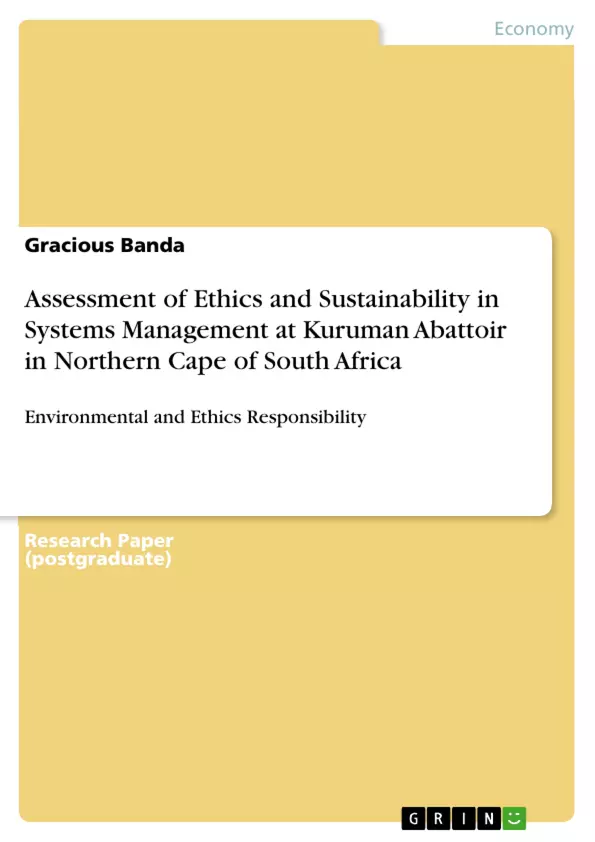In this global age and in the cosmos which we all are a part of, corporate governance, good business conduct of economic responsibility, legal responsibility, ethical responsibility both socially and environmentally are all key elements and popular terminologies in the day-to-day operations and management of majority of organisations, private or public.
In a red meat abattoir business, whether it be in the high throughput or low throughput category, both ethical and environmental responsibility result in yielding of several benefits economically, socially and technologically which are a basis of sustainability for a happy and healthy society and its planet today and in the future.
Inhaltsverzeichnis (Table of Contents)
- Assessment of Ethics and Sustainability in Systems management at Kuruman Abattoir in Northern Cape of South Africa
- 1. Introduction
- 1.1. Background
- 1.2. Problem Statement
- 1.3. Research Objectives
- 1.4. Scope and Limitations
- 1.5. Research Methodology
- 2. Literature Review
- 2.1. Ethics
- 2.2. Sustainability
- 2.3. Systems Management
- 2.4. Abattoirs
- 2.5. Stakeholder Engagement
- 2.6. Ethical Decision Making
- 2.7. Sustainable Development Goals
- 2.8. Best Practices for Sustainable Abattoirs
- 2.9. Ethical Considerations in Meat Production
- 2.10. The Role of Technology in Ethical and Sustainable Systems Management
- 3. Case Study: Kuruman Abattoir
- 3.1. Company Profile
- 3.2. Operational Processes
- 3.3. Ethical and Sustainable Practices
- 4. Data Analysis and Findings
- 4.1. Ethical Considerations
- 4.2. Sustainability Issues
- 4.3. Stakeholder Perspectives
- 4.4. Recommendations for Improvement
- 5. Conclusion
Zielsetzung und Themenschwerpunkte (Objectives and Key Themes)
This study aims to assess the ethical and sustainability performance of systems management at Kuruman Abattoir in the Northern Cape of South Africa. The research explores the company's operational processes, ethical practices, and sustainability initiatives, considering stakeholder perspectives and identifying areas for improvement.
- Ethics in systems management
- Sustainability principles in abattoir operations
- Stakeholder engagement and ethical decision making
- Impact of technology on ethical and sustainable practices
- Recommendations for improving ethical and sustainability performance
Zusammenfassung der Kapitel (Chapter Summaries)
Chapter 1: Introduction
This chapter provides background information on the study, outlining the problem statement, research objectives, scope and limitations, and the methodology used. It sets the context for the subsequent analysis of ethics and sustainability at Kuruman Abattoir.
Chapter 2: Literature Review
This chapter explores relevant literature on ethics, sustainability, systems management, abattoirs, stakeholder engagement, and ethical decision making. It provides a theoretical framework for understanding the concepts and practices discussed in the study.
Chapter 3: Case Study: Kuruman Abattoir
This chapter focuses on the case study of Kuruman Abattoir, providing details on the company's profile, operational processes, and current ethical and sustainable practices.
Chapter 4: Data Analysis and Findings
This chapter presents an analysis of the data gathered through the case study, exploring ethical considerations, sustainability issues, stakeholder perspectives, and recommendations for improvement.
Chapter 5: Conclusion
(This chapter is excluded to avoid spoilers.)
Schlüsselwörter (Keywords)
Ethics, sustainability, systems management, abattoir, Kuruman, Northern Cape, South Africa, stakeholder engagement, ethical decision making, sustainable development goals, best practices, technology, recommendations.
Frequently Asked Questions
What is the focus of the Kuruman Abattoir study?
The study assesses ethics and sustainability in the systems management of a red meat abattoir in the Northern Cape of South Africa.
Why are ethics and sustainability important in the meat industry?
They yield economic, social, and technological benefits, ensuring a basis for a healthy society and sustainable environmental practices.
What are the key ethical considerations in meat production mentioned?
The study covers legal responsibility, ethical decision-making, stakeholder engagement, and social responsibility within the abattoir's operations.
How does technology influence sustainable abattoir management?
Technology plays a vital role in improving efficiency, ensuring food safety, and managing environmental impacts more effectively.
What are the Sustainable Development Goals (SDGs) in this context?
The research explores how abattoir operations can align with global SDGs to promote economic responsibility and environmental protection.
- Citation du texte
- Gracious Banda (Auteur), 2016, Assessment of Ethics and Sustainability in Systems Management at Kuruman Abattoir in Northern Cape of South Africa, Munich, GRIN Verlag, https://www.grin.com/document/388080



